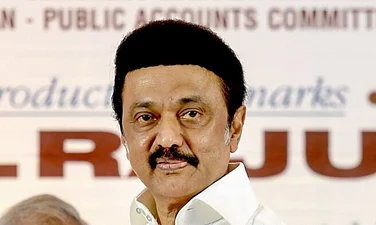Chit funds, the media, politicians of the ruling Trinamool Congress (TMC). For thousands of investors in West Bengal, it’s a triad that has led to financial ruin. The symbiosis was arrived at some four years ago, when it became evident that the CPI(M) regime was on the way out and that Mamata Banerjee’s TMC would be voted in. By the time Mamata became chief minister in May 2011, the wheels and cogs were moving smoothly enough for Sudipta Sen, the proprietor of the Saradha chit fund company, now under arrest, to give an informal diktat to staffers at the newspapers his group ran: “The newspaper should bring a smile to Mamata’s face.”
Sen wasn’t the only chit fund organiser to sense the change in the political theatre and come up with an advantageous script. Many others too invested in buying up existing newspapers and television channels, cultivating links with the TMC and using media build-up to boost business, sometimes with dubious promises of fabulous returns from investments in real estate, plantations and so on. Getting ruling party politicians on board, often at enormous salaries, was part of the show. And by keeping the party happy, the companies hoped to avoid—or at least delay—official action should they run into trouble.
A cosy club it was. The party and its politicians got flattering reports, glowing editorials. The company’s own business expansions—chiefly in real estate—would be tom-tommed in reports and advertisements. The high returns promised would lure small investors, especially from rural and semi-urban areas. Lulled by the salaries on offer, even journalists found it easier to shed their scepticism.
In Sen’s media companies, the TMC presence was in the form of Kunal Ghosh and Srinjoy Bose, both Rajya Sabha MPs of the party. Ghosh was CEO of Channel 10, and is now under fire for his association with Sen. He claims he performed only editorial functions though he was given a management designation. The channel was started in 2010 through an editorial arrangement with the pro-TMC Bengali newspaper Samvad Pratidin, of which Bose was editor. Ghosh was hired on a salary running into lakhs—it’s whispered that the take-home per month was Rs 30 lakh. But he says he got it reduced to Rs 9 lakh after becoming an MP in 2011. Ghosh was also doubling as executive chairman of the Saradha group’s media business.
It’s not difficult to understand why chit fund groups made acquisitions in media. Says an insider, “The media came in handy to create a good social image among the soft targets. The poor and illiterate rural investors thought their money was in safe hands when they saw powerful politicians endorsing the companies on their channels.” He even listed some dirty tricks: “The companies would hire a factory for showcasing products they claimed to be making or marketing—everything from spices to cement. They’d buy a small plot in the middle of a vast expanse, erect a board announcing a real-estate project to give the impression that it was going to be a large project. They’d announce projects in agriculture, hospitals, hotels to fool the public.”
No wonder chit funds managed nearly 30 newspapers or periodicals and six TV channels. Sen’s group managed three channels and nine newspapers. What’s difficult to understand, though, is how they managed to get permission. Applications to run newspapers and TV channels are vetted by five ministries of the central government. How is it, people wonder, that there was no red-flagging of chit funds suddenly wanting to run newspapers and TV channels. Also, they wonder if political connections ensured that the state government did not act on ads of what were essentially Ponzi schemes. In fact, till Saradha went bust, the authorities did not take any notice of the advertisements. Even now, dailies like Khabar 365 Din (Rose Valley group), Bhorer Varta (Silicon group), Prayag (Prayag group), Aabar Yugantar (Angel group), Ekdin (Chakra group), Pratyahik Khabar (Tower group) and Newz Bangla (Kolkata Weir Industries) have a free run.
One factor that might have helped keep the chit funds under the radar is the TMC’s relationship with the Congress at the Centre. As long as TMC was an ally of the Congress, the chit funds with TMC associations did not face problems, says a media commentator. However, when the Saradha group went bust, the TMC was no longer an ally of the Congress. This might have prompted some of the action: early this year, after some complaints, a list of 73 multi-level marketing companies was prepared by Union minister of state for corporate affairs Sachin Pilot. Among those on the list were Saradha, Rose Valley, Prayag, Tower Infotech, Chakra and Silicon. Some companies were found involved in schemes not approved by SEBI. These companies are now caught up in protracted legal battles.
Of the rise and rise of chit fund companies, Rajat Roy, a media commentator, says, “These companies began by sponsoring programmes on television. From that they went on to owning the channels and newspapers. And then they went on to prey on depositors from villages with images of politicians endorsing their products.” The story of their fall, perhaps, has to be told by the 800-odd journalists who lost their jobs when some groups collapsed. And by the thousands of investors who see no hope of getting back their money.


























